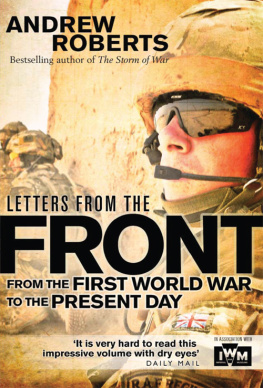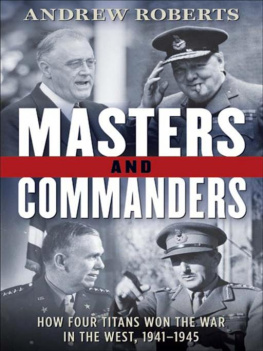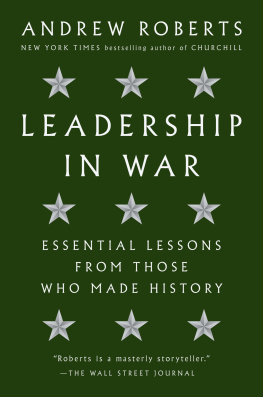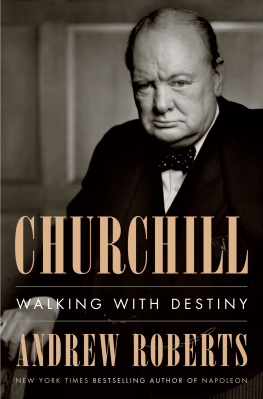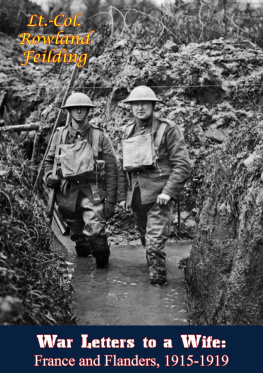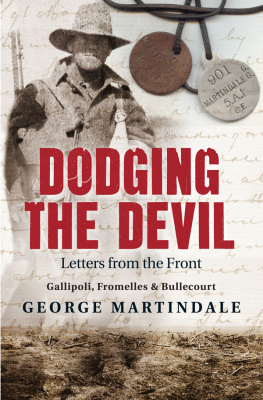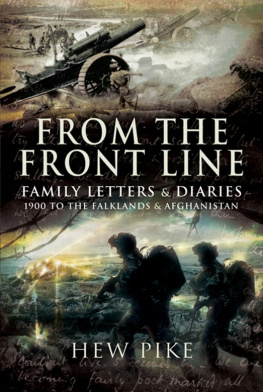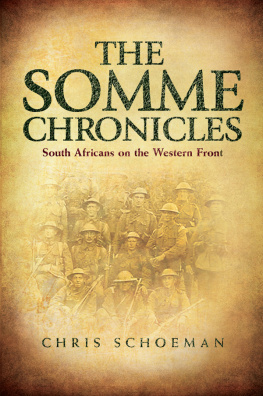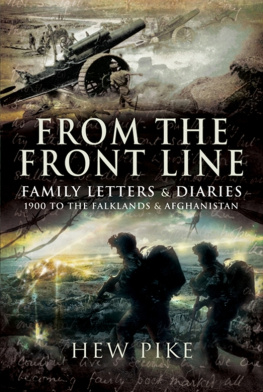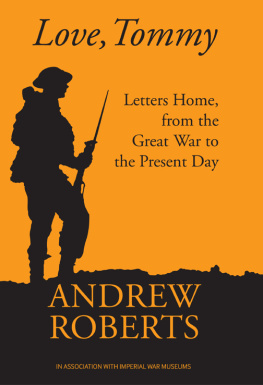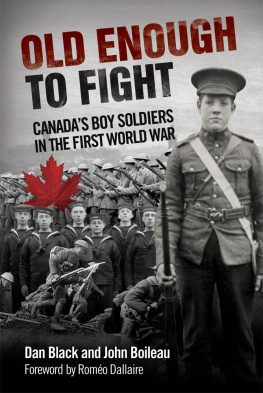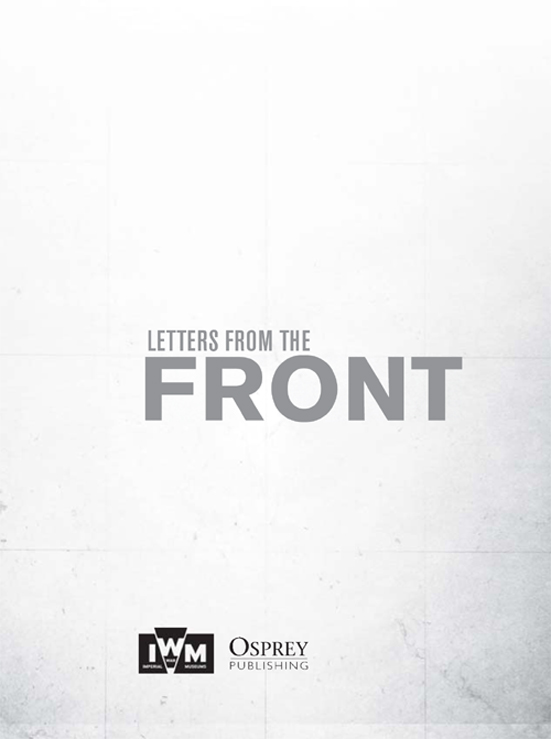CONTENTS
Also by Andrew Roberts
The Storm of War
Masters and Commanders
The Art of War: Great Commanders of the Modern
World (2 volumes)
A History of the English-Speaking Peoples Since 1900
Waterloo
Hitler and Churchill
Eminent Churchillians
To my step-mother Charmian, whose father, Lieutenant Colonel Robin Lindsay, won an MC fighting his way into Libya and a DSO fighting his way out.
INTRODUCTION
Soldiers letters home to their loved ones have a raw power denied to almost all other epistolary writing. Written for the most part without thought to publication, or to live for the ages, they try to make that seemingly impossible connection: between the writer who has seen the terrible face of war and the reader who generally has not. The fact that the writer is facing the horrors of war precisely in order to protect his reader from those selfsame horrors adds another powerful dynamic to the correspondence. In publishing these superb letters home from British soldiers, sailors and airmen fighting in the wars of the 20th and 21st centuries, Osprey is performing a fine service to scholarship, as well as allowing us to glimpse into the lives of heroes on the front line.
The knowledge that each of these letters might be the last communication the serviceman ever had with his loved ones gives every page of this book a poignancy that is only otherwise found when hearing the voices of pilots of doomed aircraft from black-box flight recorders, or seeing a living-will videotape. The fact that all too often the writers of these letters did not survive gives them a profundity usually reserved only for deathbed confessions. And somehow the very fact that they are not over-written or self-consciously literary merely adds to their haunting power. This is life and death in the raw, expressed by British serviceman across nearly 100 years.
The subjects the letters cover are the elemental ones that have not altered much since the dawn of war. Men writing home from the Peloponnesian and the Punic conflicts wanted to downplay their heroism but also their fears, to grouse about their rations, to discuss their love of country and city, to lament the deaths of comrades, to ponder the nature of the enemy, to ask for news and provisions, to comment on their leaders, to wish the war could end quickly but victoriously, to complain about their billets, and so on, but above all they wanted to express their love for their families and friends, whom they feared they would never see again. Human nature cant have changed much in the intervening two millennia, for those are also substantially the same subjects written about by the British Tommy in this fascinating and beautifully produced volume.
A mans immediate prospect of death, as Dr Johnson said in the inexact but related context of being hanged in a fortnight, concentrates his mind wonderfully. Of course some housekeeping remarks do occasionally get written Thanks so much for the hankies but overall its remarkable how these letters are shorn of much of the minor paraphernalia that can otherwise fill day-to-day existence. They get to the point quickly, and in every area except one they tend to tell the truth, for whats the point of dissembling when on the brink of eternity? That is what makes soldiers letters home such an important tool for historians. However, the one area where the soldiers routinely downplay the truth is in estimating their likelihood of death. This is not because they have not considered the odds themselves of course they have but because they desperately want to protect their parents, wives, lovers and children from the terrible thought that lies behind every letter written: that this could be the last.
When it comes to soldiers testimonies about how to avoid the snipers bullet, or what its like to sleep in a lice-ridden blanket, or how to get by on three hours sleep a night, or what the weird shrieking noise of shells sounds like compared to the high-pitched whistle of bullets, this book is a veritable treasure trove of invaluable first-hand information. These letters pulsate with immediacy: you are there with them, alternating between empathizing with the young man who has just returned from vicious, often hand-to-hand fighting in the trenches of the Great War and empathizing just as powerfully with his readers My darling Mother and Father, My dear Vera, My own beloved wife who received the letter all those years ago. Trying to imagine their emotional response to getting aletter from the postman, rather than a constantly feared telegram from the War Office, makes this book an emotionally powerful experience. I defy you to read the haunting letter from Francis Herbert Gautier to his four-year-old daughter Marie, written for when she is able to understand, without experiencing a lump in your throat or a tear welling unbidden to your eye. I couldnt.
As well as being a fine tribute to the Tommy through the ages, this book is a very valuable social document. The Great War was fundamentally different from earlier conflicts in which Britain had taken part, in that ordinary Britons were conscripted for service. Besides the press-gang of the Napoleonic Wars, which generally only operated in coastal towns and largely on an ad hoc basis according to immediate manpower needs, Britains wars had hitherto been fought by volunteers. The decision in January 1916 to allow the government to force citizens to serve was hugely controversial, and it radically changed the nature of the British Army. For the rest of the war, and into the Second World War when partial conscription was adopted even before it broke out, the services effectively became the nation in uniform, and a number of the letters in this volume reflect social concerns that were mirrored by the nation at large.
As well as relating the pulse-quickening, adrenaline-pumping rush of clashing arms, some of these letters reflect that other well-known side to soldiering: stultifying boredom. Nothing very exciting happens, complains a soldier of the Great War here. Until, of course, it does. Also highlighted is the way in which the stress subtly affects social relationships among men living on the precipice, in ways one might not automatically have considered. We laugh much more readily these days, writes a soldier, at things that normally we would consider merely amusing. This book also underlines the importance of cups of tea to the Tommy, something that differentiates the British soldier from the Prussian grenadier or French poilu.
The enduring power of a soldiers letter home was reinforced as recently as October 2010 when the group The Soldiers released their album Letters Home, whose title songs lyrics featured words that were written in a real last letter of Tony Downes, a young soldier in the 1st Battalion, Grenadier Guards, who had died in Helmand Province, Afghanistan, in June 2007. It was the first time that a last letter had ever been set to music for commercial release, and it works on a musical, as well as emotional level. Im sorry to put you through all this, Im sorry there was no last kiss, reads one stanza. Im up here in heaven, youre free to start again. My love will never end. Im sorry to my family and friends. The group composed of Lance Corporal Ryan Idzi, Staff Sergeant Richie Maddocks and Sergeant Major Gary Chilton dedicated the title track to Downes, whose mother Sheryl said: It shows how much my son was a loving and caring person. I can just see him now, looking down on us all with his million-watt smile. He will be so proud. If The Soldiers need any more last letter lyrics from earlier conflicts, they need look no further than this volume, several of which would not be out of place in an operatic libretto either, despite having been originally written for an audience confined to grieving parents or a widow.

